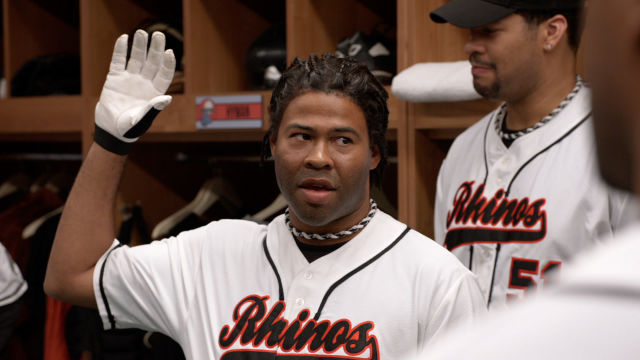
Courtesy of Comedy Central
Your On Fire Correspondent is demanding answers.
What is it, athletes? What is it that you love so much about slapping each others’ asses?
Just this week, your On Fire Correspondent was educated about the intriguing sports phenomenon of slap-ass.
Slap-ass is the common sports practice of slapping a team mate’s ass as a sign of camaraderie or good faith. It can manifest itself as a playful tap or a powerful smack. It all depends on the temperament of the person delivering the blow. In this way, the slappee is completely at the mercy of the slapper.
Your On Fire Correspondent was deep in a YouTube binge when she (or he) first encountered slap-ass. She (or he) was enjoying sketch after sketch of “Key & Peele” and came across a sketch called “Slap-ass.” Intrigued, she (or he) decided to investigate further.
“Slap-ass” recounts the heart-wrenching tale of Rafi and Garcia, two baseball players for a team called the Rhinos. Rafi, a free-spirited player, loves to slap-ass. Slap-ass is how he’s been raised; it’s all he really knows. After every game, he gives each teammate a high five and a slap on the ass. After every slap on the ass, he yells, “SLAP-ASS!” But the Rhinos can only handle so much slap-ass. Rafi goes to slap fellow teammate Garcia, and is taken aback when Garcia shouts “NO!” Garcia recounts the horrors of slap-ass and how each teammate has felt personally victimized by Rafi’s twitching palm. Rafi sinks into a deep sorrow when he realizes his behaviour is no longer sustainable.
In a follow-up sketch released just last week, Key and Peele reprised their iconic roles of Garcia and Rafi in “Slap-ass: In Recovery.” This continuation of the Slap-Ass Saga begins with a fellow teammate engaging in slap-ass with Garcia – but Garcia stops him, informing the locker room that Rafi is just coming out of treatment, a sort of “slap-ass rehab,” so to speak, and shouldn’t be triggered by other teammates in any slap-ass context. Rafi returns, and seems to be cured. All is well. But a new team member comes and Rafi cannot resist– he resumes into past behavior and the slap-ass cycle repeats.
Key and Peele really hit the nail on the head (or on the ass) with this series of sketches. What the f–k, they ask their viewers, is slap-ass all about? What purpose does it serve?
It seems that Key and Peele don’t quite know. And neither does your On Fire Correspondent.
Some scholars say that slap-ass builds a sense of community and team between players.
Others suppose that the practice is “problematic” or constitutes “sexual harassment.”
Only one thing’s for sure: the athletic community seems to be the only community that fully understands slap-ass.
But here is your On Fire Correspondent’s burning question: why is it only athletes who are allowed to engage in slap-assery? If it increases camaraderie, why not adopt slap-ass at school? At work? At a financially independent student newspaper?
In the name of investigative journalism, your On Fire Correspondent decided to adopt a slap-ass model herself (or himself) in the offices of The Emory Wheel to see just what it is about slap-ass that brings teams together.
In order to avoid offending any individuals, your On Fire Correspondent asked for permission before each ass-slap. This resulted in not one editor giving their consent to being slap-assed.
One editor said “I guess you could do that,” but he refused to get off of the couch on which he was sitting. Another editor gave tentative consent, but insisted, “Not right now; some other time,” and walked away with a weird look on her face.
So it seems that this business model isn’t sustainable in a semi-professional environment. But what does that say about the athletic community?
Your On Fire Correspondent literally just does not know.
In the end, it was your own unsuspecting On Fire Correspondent that got slap-assed. It was a shock, but it was also exciting. It was not something she (or he) would appreciate from anyone but a consensual friend or colleague.
The takeaway? Get consent before you slap-ass, dear readers. Slap thoughtfully, and slap safe.
The Emory Wheel was founded in 1919 and is currently the only independent, student-run newspaper of Emory University. The Wheel publishes weekly on Wednesdays during the academic year, except during University holidays and scheduled publication intermissions.
The Wheel is financially and editorially independent from the University. All of its content is generated by the Wheel’s more than 100 student staff members and contributing writers, and its printing costs are covered by profits from self-generated advertising sales.





